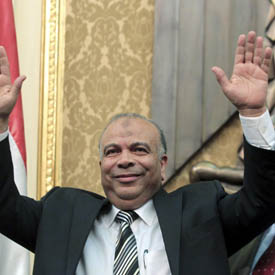Chaotic day for Egypt’s new parliamentarians
As Egypt prepares to mark a year since anti-government protests ended President Hosni Mubarak’s 30-year rule, Channel 4 News looks at the new parliament’s debut appearance.

It is Egypt’s first freely elected parliament in six decades – a resounding victory for this chapter of the Arab Spring. The violent and bloody protests which first swept the nation on January 25, 2011 erupted just days after the overthrow of the Tunisian president. Egyptian demonstrators vowed to continue until they too had claimed President Mubarak’s political life.
So after polls opened on 28 November for elections which lasted around a month, Monday’s opening session was always going to be an eagerly awaited affair. The new MPs were forced to abandon their cars to reach the building after being hemmed in by heavy crowds, including many demanding that military rulers immediately stepped down – a claim not endorsed by the majority Muslim Brotherhood’s Freedom and Justice Party (FJP).
Millions more consumed footage as it streamed from television sets in Cairo’s shop windows and street cafes.
This is democracy that had left this hall for years, and now the people have grasped it. Mahmood el-Sakka, Egyptian parliament speaker
But by all accounts, the opener gave good grounds for believing that perhaps it was a spring which, having marched on through summer, autumn and winter, could continue for several months more, as a dispute over choosing a speaker degenerated into a shouting match which overshadowed the day.
The opening session began with fitting solemnity as the 508 parliamentarians held a moment’s silence to honour those killed in the uprising against Mubarak. They then answered their names and swore oaths to serve the new Egypt.
New speaker
But they soon began to go off-message. Salafist lawyer Mamdouh Ismail ad-libbed his lines to insert “if not in contradiction with God’s doctrine” to his oath, prompting other members of the Salafi bloc – the second largest with nearly 25 per cent of seats – to follow.
Meanwhile, Ziad el-Elaimy, a Social Democratic Party lawmaker, tried to swear an oath to the revolution instead of the usual vow to the Egyptian state and constitution. Mahmoud el-Sakka, 81, a member of the liberal Wafd Party who, as the oldest member of the lower house, acted as speaker, repeatedly tried to rein them in.
Then began the important task of picking the new speaker, which ended up keeping members inside the chamber until well into nightfall. The speaker was widely expected to be FJP member, Mohamed Sadd el-Katatni, after the Brotherhood announced last week that a broad coalition of parties had agreed with them to elect him into office.
With a 38 per cent share allocated to lists in the parliament’s complex electoral system, the party will play a key role in drafting up the new constitution, but has promised that all Egyptians will have a voice in the new assembly.
But instead Essam Sultan, a former Brotherhood official who broke with the group in the mid-1990s to start a new party, stood up in the chamber to announce he would compete against him for the job.
People’s democracy
As Mr el-Sakka attempted to shout him into silence, Mohamed el-Beltagy, a senior figure in the FJP, began shouting at Mr Sultan to listen to the acting speaker. It was not long before members of the Brotherhood party and Mr Sultan’s Wassat Party were yelling at one another.
But the Brotherhood beat back the challenge, successfully winning the vote. Late on Monday night, Mr Katatni said in his victory speech: “This is democracy that had left this hall for years, and now the people have grasped it.”
In an admission that the next stage in Egypt’s newest MPs’ battle to shrug off years of authoritarian rule has only just begun, he said: “We want Egypt and the whole world to know that our revolution will continue and we will not rest and our eyes won’t sleep until the revolution fulfils all its demands.”